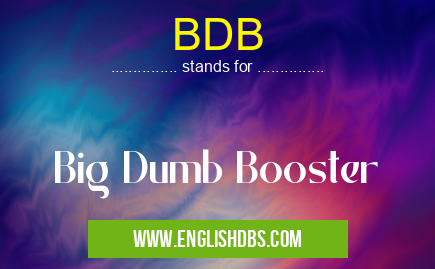What does BDB mean in UNCLASSIFIED
BDB is an abbreviation commonly encountered in various contexts, including technology, business, and space exploration. It typically stands for Big Dumb Booster.

BDB meaning in Unclassified in Miscellaneous
BDB mostly used in an acronym Unclassified in Category Miscellaneous that means Big Dumb Booster
Shorthand: BDB,
Full Form: Big Dumb Booster
For more information of "Big Dumb Booster", see the section below.
Meaning of BDB
The term "Big Dumb Booster" is used to describe a large, non-reusable rocket designed primarily to provide significant thrust for a spacecraft during its initial launch phase. BDBs are often used to lift heavy payloads into orbit or for deep space missions.
Characteristics of BDBs
- Heavy Payload Capacity: BDBs are designed to lift substantial payloads into space, typically ranging from several tons to dozens of tons.
- Non-Reusable: Unlike reusable rockets, BDBs are not designed to be recovered and reused after launch. They are typically discarded or destroyed after their primary mission.
- Low Cost and Simplicity: BDBs are often favored over more sophisticated rockets due to their low cost and simple design. They emphasize reliability and affordability over efficiency or reusability.
- Limited Maneuverability: BDBs typically have limited maneuverability and are primarily designed for straight-line acceleration.
Essential Questions and Answers on Big Dumb Booster in "MISCELLANEOUS»UNFILED"
What is a Big Dumb Booster (BDB)?
A Big Dumb Booster (BDB) is a simplified, heavy-lift launch vehicle designed to carry payloads into space at a low cost. It typically employs a cluster of relatively simple and inexpensive engines, resulting in a high thrust-to-weight ratio.
Why are BDBs gaining popularity?
BDBs are gaining popularity due to their ability to provide a cost-effective solution for launching large payloads into orbit. By using multiple engines, they can achieve high thrust without the need for complex and expensive propulsion systems.
What are the advantages of using a BDB?
The advantages of using a BDB include:
- Reduced development and production costs
- Higher payload capacity
- Simplified design
- Reliability due to multiple engine redundancy
What are the challenges associated with BDBs?
The challenges associated with BDBs include:
- Managing the complexity of multiple engines
- Ensuring structural integrity under high thrust
- Controlling vibrations and acoustic loads
Are there any existing or planned BDB projects?
Yes, there are several existing and planned BDB projects, including:
- SpaceX's Super Heavy (Falcon Heavy)
- Blue Origin's New Glenn
- ULA's Vulcan Centaur
- China's Long March 9
Final Words: BDB (Big Dumb Booster) refers to a type of large, non-reusable rocket used to provide substantial thrust during a spacecraft's initial launch phase. BDBs are characterized by their heavy payload capacity, low cost, and limited maneuverability. They are often employed in situations where affordability and reliability are prioritized over complexity and reusability.
BDB also stands for: |
|
| All stands for BDB |
